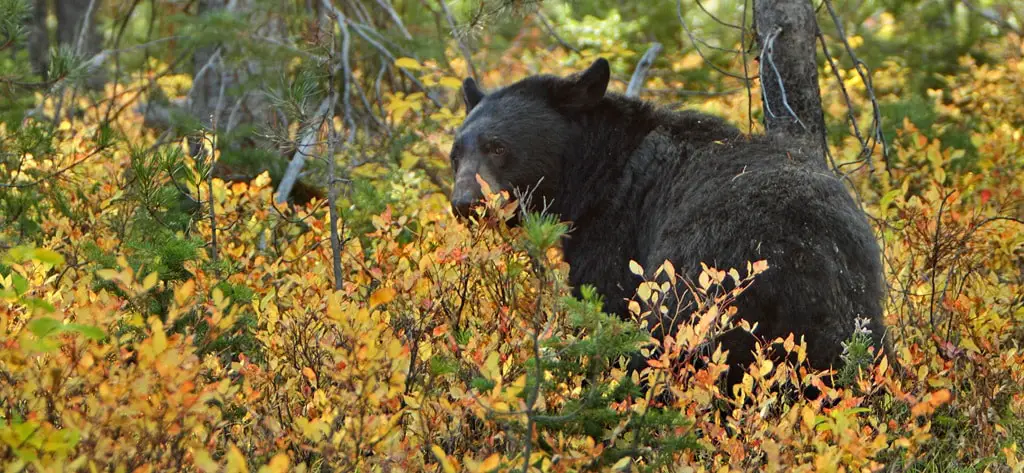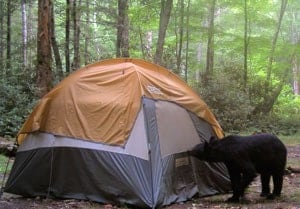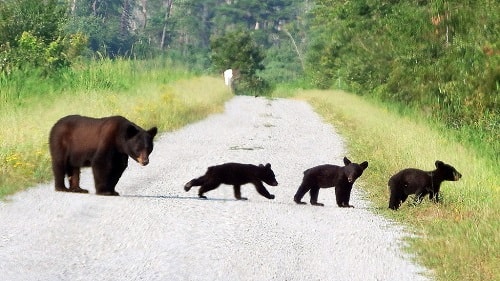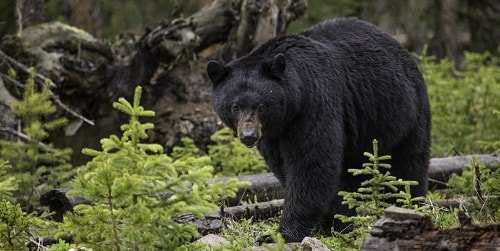The first time I encountered a black bear was at the Manitoba Riding Mountain National Park – it was terrifying. The first thing that pops to mind is that you are done – the beast would be the last thing you will be seeing. As years past by I met two more of them – both times were while I was still in my tent. My way of action was always to keep quiet; however, that got me thinking – what to do if a black bear is outside your tent?

There are six things you can do if a black bear is outside your tent – you can do nothing, make some noise, use a bear spray or pull out your firearm. Also, if the beast is quite near and attempts to get in – you can fight it or otherwise – get away.
From my perspective, it is better to start passively and gradually become more aggressive – this way you will avoid making a mistake which could make things even worse.
There are many reasons why camping might not be safe – although I believe that bears could be handled wisely and they shouldn’t scare you that much.
1. Do Nothing
The least aggressive method you can take when a bear is outside your tent is practically doing nothing. The idea behind it is that the bears aren’t actually after you – they seek your food and frankly hate the smell of human flesh.
If you are already inside your tent – use it as a shelter, it is not likely the animal would get inside or tear the walls to attack you. When I first suspected there was a bear outside my tent – that was the approach I took.
Frankly, I did so because I was terrified and froze in place, it wasn’t that I knew what I was doing. Nevertheless, my instincts were right, and the bear finally got away.
If you ever have woken up and seen bear footprints on the ground, that proves this method works – merely because you kept quite unintentionally during your sleep.
2. Make Some Noise
So the previous approach didn’t work – you kept still in your tent, although the bear refuses to leave and gets closer to your shelter. In this case, you can continue with the quiet approach, yet, it would be a lot more stressful.
Another technique is doing the opposite – making a lot of noise to scare away the intimidating animal. It’s hard to realize that, however, bears are scared of human, even though they are much bigger and stronger.
If you chose to make noise – do it as loud as you can; scream your lungs out, use whistlers, hit your pot with a stick, collide metals and hit the ground with your legs.
Remember, the louder things are going to be, the more it is likely you will scare the bear away.
3. Try a Bear Spray
So you’ve tried to scare the beast away by making loud noises, yet, it refuses to escape and maintain in your campsite. That is usually the case when the bears are used to humans and don’t get scared so easily.
Well, if you’ve brought a bear spray along the way – there is a good chance you will be using it soon. Even if you won’t, having it in your backpack increases your confidence and prevents you from making hasty decisions.
Nevertheless, it wouldn’t be useful if you do it the wrong way – when you pull out the spray and intent to use it, I suggest you take the following steps.
Never Use it Inside The Tent
Like sprays against criminals and potentially street attackers, the bear spray contains Capsaicin, which is an active component of chili peppers.
That substance irritates your eyes so severely that it would be impossible to sleep in your tent for the rest of your trip.
When you decide to go for it, go outside and spray it towards the bear in the open air. If you wish to stay in, you may sprinkle it through the door – however, that requires the bear to be in the entrance side.
Spray it Upwind
As I said, the spray could harm you if by any chance it lands on your skin or eyes. Therefore, it is essential that you recognize the wind’s direction and use it as leverage when aiming the bear.
Also, considering that the bear is not that close to you, spraying against the wind would most probably won’t reach the beast and be a waste attempt to drive it away.
Make Sure There is a Clear Shot
This one is quite obvious, although very easy to miss. Let’s say the bear is behind your tent or a tree trunk, and there is an object which separates him and you.
If you try to overcome it and spray it as things are – most of the irritating particles would be blocked and won’t reach the bear’s face.
Make sure that you have a clear shot so most of the spray would land on the beast – otherwise; you would merely make it angrier.
4. Pull Your Firearm
If you own a firearm, you should use it when things start to go wrong. I’m not saying that should be your first way of action – I believe the right way is doing things gradually – from keeping quiet to making noises to using a gun.
When you decide to make a shot, I suggest that your first one would be to scare it away instead of harming it. For that, I recommend that you raise your weapon first and shoot a bullet toward the sky.
There are two main reasons behind that – the first would be the case when you miss the central body area or its face. If the bullet happened to scratch the bear and hadn’t done any severe damage – there are good chances the beat would get angry and start an attack.
Also, when you fire at the sky, you lower the chances of hurting people nearby who happened to be at the wrong place in the wrong time.
Another technique is shooting the bear from inside your tent, although this is a VERY DANGEROUS approach and you have to identify the creature first.
There have been a few unfortunate events when people got hurt or even killed since the shooter has only suspected the roaming noises came from bears.
If you are not sure what is walking outside and you have no clear view, you can make a little hole with a knife to get a better visual view.
5. Fight it
That option is only relevant when the bear begins to attack you while you are hiding from it in your tent and you have no other means of protection.
Frankly, the chances for that to happen are meager – the beast wouldn’t have any interest unless you have some open food cans spread inside the tent all over the place.
However, that is still a possible scenario, and then your best choice is trying to fight it. If you will to attack it outside your tent – you don’t stand a chance, and it would be utterly stupid.
Although, when you are sitting inside, you have the shelter advantage and you could use your legs to kick the bear away.
When you do it, you have to be aggressive – go wild and hurt it as much as you can (making some loud noises would be a nice touch).
6. Get Away
So you are inside your tent and hear the noises of the terrifying bear. You’ve chosen to wait inside and when that hadn’t worked – made some loud noises.
Nevertheless, the bear refuses to leave, and you have no other means for protection, such as a bear spray or a firearm.
In that scenario, getting away is a reasonable choice – especially if you went outside the tent and encountered the bear by surprise. If you choose to run – you’ve got to do it fast since the beast would most probably chase you.
In mind, you should point yourself toward a water source – bears hate water and most likely stay out of it. Also, if you know and campfire area nearby – go there, these animals get scared very quickly by fire.
When none of these are reachable, I suggest that you find a high place to climb on (perhaps a tree or a rocks wall) – like dogs, bears cannot climb.
Still, getting away is a poor choice if you are already inside the tent since you will be giving up on your shelter – do it only when you have no other choice.
What to do After The Bear Got Away?
So a bear paid a visit at your campsite and finally got away – what now? Well, my first advice to you is to calm down.
Facing a bear for the first time could and will be intimidating – you have no idea what to anticipate and keep imagining the worst case scenario. Still, if the danger has passed, there is no reason for you to stay agitated.
My second advice is moving to a different campsite since bears tend to return. If you are brave enough and decided to stay – make sure that you clean your area entirely and conceal all food cans so their scent wouldn’t be felt.
Also, keep in mind that fire would most probably scare it away. Some believe that light attracts bears – well, that is partially true. Flashlights are not recommended; however, a campfire is a different story.
I suggest that you build a bonfire which would burn all night – I’ve dedicated a whole article on that matter and provided some useful tips and techniques.
Will a Tent Provide Some Protection From Bears?
There is a common misconception which states that your tent would prevent the bear from smelling you and the food you’ve brought.
Bears have an excellent sense of smell – just like dogs, and if you can’t feel things, it doesn’t mean that the beast can’t also.
Nevertheless, a tent provides psychological protection and prevents eye content – do not underestimate that, it could be the little different which would withhold an attack.
When the bear comes across your campsite and encounters the tent, his natural behavior is to circle it, sniff it a little and finally leave. If you sleep outside your tent, you will very quickly get stressed, and your eye contact would agitate it very quickly.

How Can I be Sure it is a Bear?
If you are not sure it is actually a bear outside – it is better to leave it without checking.
Still, bears usually walk relatively slow and breathe heavily. Also, if it gets close to your tent, you could even hear it sniffing the bottom of the tent.
If the sun came out and you woke up to the sound of bears, you will be able to see a shadow in its shape. I wouldn’t suggest unzipping the door and glancing out – that might stress it and escalate things.
What Bears Are Dangerous?
Whether you are camping or just spending your time outdoors, it is not rare to encounter bears – nevertheless, it is essential to distinguish those which could be relatively dangerous.
To make things clear, when I talk about black bears I specifically talk about the American black bear (Ursus americanus), which is a is a medium-sized bear native to North America.
Well, these would be dangerous if you by any chance encounter a mother with cubs, or perhaps a sizeable predatory male.
A Mother With Cubs
A Mother bear with her cubs could be very dangerous – she will become extremely aggressive to protect her little ones. If you encounter those, you should be really careful about your next steps.
First, clear the area slowly by moving backward while maintaining eye contact. Second, don’t make any sharp movements which might be interpreted as threats by the mother.

The Predatory Male
The second dangerous beast is the predatory male. Even though the name is intimidating, you should remember that the chances of encountering one are scarce.
This bear is a typical Ursus americanus; however, it was starved roughly in a way that it sees no other alternative rather than attacking. Also, this one, in particular, would follow you and chase you down to make you his prey.
Distinguishing a predatory male from a regular back bear is quite easy – while the second would seem scared and escape when you make sounds, the first would seem aggressive and stay in place.
Also, the predatory one would be quieter without the huffing, puffing exhibitionism of an agitated beast. When you are trying to back off – the predatory male would gaze at you in curiosity and maintain silent in a stressful manner.

What to do if a Bear Follows You?
Let’s say you are hiking and see a bear from a distant – frankly, that happened to me not once. Still, you notice that it moves along with you as you keep hiking your trail. What should you do?
Well, from my experience, it is better to ignore them while maintaining the same pace rhythm. The idea is that the bear has no intention of attacking you (unless it is a predator one as described above – although it is scarce).
Nevertheless, if you start making sharp movements and change your current behavior – it might interpret it as a threatening movement and become aggressive.
If a bear followed you to your campsite or perhaps keeps on returning to your area night after night – change your location. While being in your tent – deal with the bear with one of the methods described above.
When he finally got away – move to a different site and make sure you keep the area clean.
Conclusions
It is common to encounter black bears when you go camping, especially when you are hanging in North America. In the vast majority of times, meeting a bear isn’t dangerous, and there is a good chance he would eventually leave your campsite if you merely do nothing.
Still, when things start to escalate, you can use a bear spray outside your tent or shoot it with your gun. It is essential that you learn how to recognize bears which could be dangerous – these would mainly be a mother with cubs and a predatory male.
If you meet a mother bear – move away slowly and maintain eye contact. If you suspect the bear is predatory (although extremely rare) – you should probably get more aggressive or otherwise – get away as fast as you can.
I hope my article has calmed you down and gave you a better view on how to deal with a black bear which is outside your tent. If you have any thoughts or new insights – let me know all about them by leaving a comment below!

